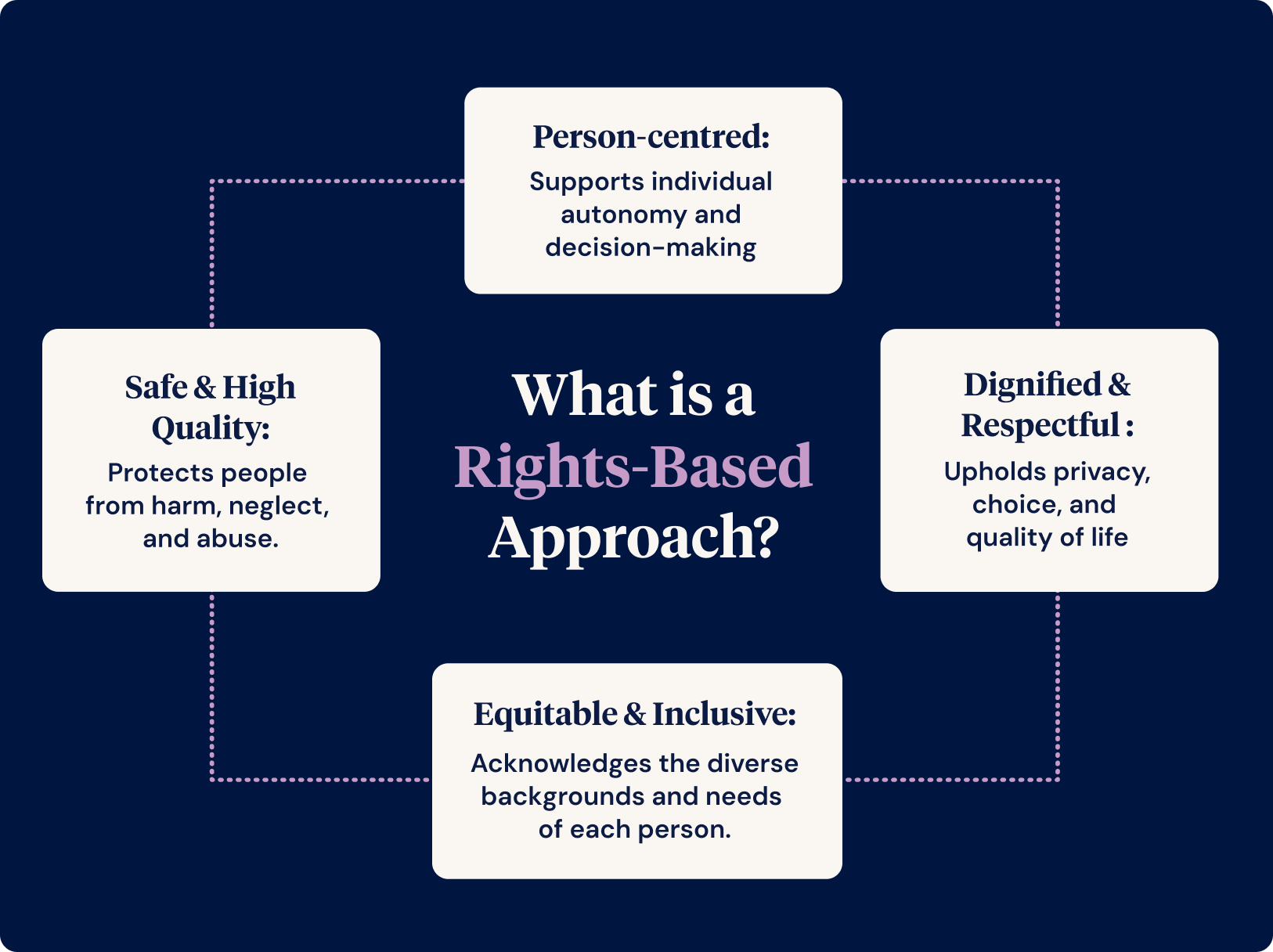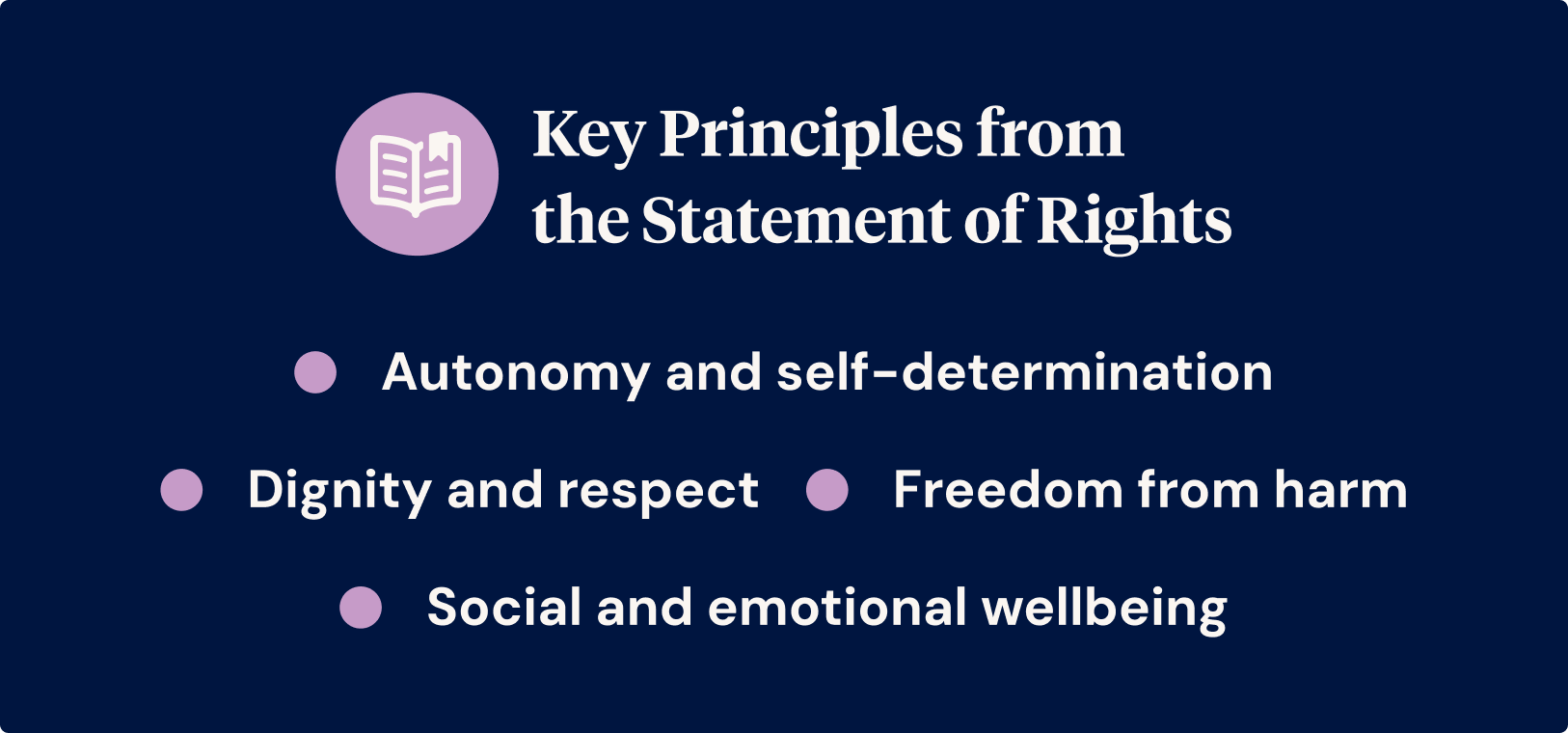A Rights-Based Approach to Aged Care Governance
In aged care, a rights-based approach means more than compliance — it ensures that older Australians receive care that respects their dignity, autonomy, and individual choices. The Aged Care Act 2024 reinforces this by embedding the Statement of Rights into law, requiring providers and directors to prioritise autonomy, fairness, and high-quality care across all services.
As the sector shifts towards stronger consumer engagement, greater legal accountability, and a more profound cultural change, directors have a clear responsibility:
Human rights must be built into the foundations of governance, shaping every decision and action.
This guide explores what auditors will assess in governance systems and covers key topics:
- What is a rights-based approach?
- Legal and ethical obligations for directors
- Balancing rights with operational challenges
- The role of training and culture change in sustaining compliance
What is a Rights-Based Approach in Aged Care?
A rights-based approach places the rights of older people at the centre of aged care services. It ensures that care is:
- Person-centred – supports individual autonomy and decision-making.
- Equitable and inclusive – acknowledges the diverse backgrounds and needs of each person.
- Dignified and respectful – upholds privacy, choice, and quality of life.
- Safe and high quality – protects people from harm, neglect, and abuse.

Key Principles from the Statement of Rights
The Statement of Rights, formally recognised under the Aged Care Act 2024, outlines the fundamental rights that must underpin care provision, including:
- Autonomy and self-determination – Older people have the right to make decisions about their care, including the right to take personal risks.
- Dignity and respect – Services must be culturally competent, inclusive, and person-centred.
- Freedom from harm – Providers must actively prevent abuse, neglect, and substandard care.
- Social and emotional wellbeing – Services should foster connection, inclusion, and meaningful engagement.
Providers must show how these principles are integrated into service design, decision-making processes, and governance practices.

Why is this Critical?
A rights-based approach is only meaningful if appropriate workforce planning, staffing levels, and clinical supervision support it.
- Understaffing undermines autonomy – When staff are rushed, efficiency often takes precedence over personalised care.
- Inadequate supervision increases risk – individuals become more vulnerable to medication errors, falls, and neglect.
- Workforce planning is a governance responsibility – Boards must monitor staffing ratios, training needs, and retention strategies to ensure that rights-based care is achievable.
Providers can use Ausmed’s Audit Readiness Tool to help identify possible evidence items that show how human rights are embedded across governance and service provision.
Auditors will assess:
- Whether policies and procedures align with the Statement of Rights.
- How governance frameworks uphold choice, dignity, and autonomy.
- How feedback and complaints mechanisms empower older people.
2. Legal and Ethical Obligations for Directors
Directors and responsible persons have clear legal duties to uphold human rights and ensure aged care services are:
- Safe and high-quality.
- Transparent and accountable.
- Compliant with regulatory requirements.
Their key obligations are under the Aged Care Act 2024, the Strengthened Aged Care Quality Standards, and the Code of Conduct for Aged Care.
Aged Care Act 2024
Under the Act, directors must:
- Ensure all services align with the Statement of Rights.
- Embed human rights principles into governance frameworks.
- Consider individual autonomy and dignity in every board-level decision.
Strengthened Aged Care Quality Standards (Effective July 2025)
Under the new standards, providers must:
- Embed person-centred care into every aspect of service delivery.
- Actively incorporate consumer feedback into decision-making.
- Ensure all staff are trained in dignity, choice, and human rights principles.
Code of Conduct for Aged Care
The Code sets clear expectations for leadership conduct. Directors and senior executives must:
- Act honestly and with integrity in all governance responsibilities.
- Promote transparency and accountability across their organisations.
- Ensure that care is delivered safely, competently, and respectfully.
Governance Implications of a Rights-Based Approach
Embedding a rights-based approach requires directors to shape governance structures that actively prioritise and protect human rights. This includes:
- Integrating human rights principles into board-level decision-making.
- Ensuring staff are trained and supported to deliver ethical, person-centred care.
- Monitoring feedback and complaints data to uncover and address systemic issues.
Governance that fails to uphold human rights increases the risk of non-compliance — and compromises the dignity, safety, and wellbeing of older Australians.
Accountability Measures for Governance Teams
To effectively embed a rights-based approach, governance teams should establish transparent accountability processes, including:
- Annual board reviews of human rights policies – to monitor compliance with quality standards.
- Regular staff training on rights and ethics – with a strong focus on continuous professional development.
- Audits of individual autonomy and inclusion – tracking how often individual preferences are honoured, even when balancing efficiency or risk considerations.
Auditors will assess:
- How governance systems enable human rights-based decision-making.
- Whether directors are receiving regular training on ethical and legal obligations.
- How policies work to prevent elder abuse, neglect, and discrimination.
3. Balancing Rights with Operational Challenges
One of the most complex aspects of governance is balancing individuals' rights with operational realities such as safety, staffing, and resources.
Dignity of Risk vs Duty of Care
Individuals have the right to make choices that involve a degree of risk. For example:
- An individual with dementia may wish to walk alone despite the risk of wandering.
- An individual may choose to enjoy foods outside of dietary restrictions.
Directors must ensure that informed decision-making processes are in place to support these rights while maintaining safety.
Resource Constraints and Staffing Pressures
Workforce shortages can make it harder to deliver individualised, rights-based care. Boards must ensure that resources are allocated in ways that prioritise staff capability, training, and individual autonomy.
Family vs Individual Perspectives
Families may sometimes disagree with an individual’s wishes. Governance teams must ensure that the older person’s choices are prioritised while managing family concerns appropriately and legally.
Auditors will review:
- How policies balance autonomy with risk management.
- How individuals and families are engaged in decision-making.
- Whether boards are actively monitoring tensions between rights and operational realities.
4. Training and Culture Change: Embedding a Rights-Based Approach
Sustaining a rights-based approach relies on continuous training and cultural transformation at all levels.
Leadership Commitment
Boards must lead by clearly establishing accountability and respect for human rights. Regular policy reviews and audits are essential.
Staff Training
Training should focus on respecting autonomy, practising cultural competence, and making ethical decisions in daily care. Directors should also undertake ongoing education to meet their governance obligations.
Consumer Participation and Feedback
Individuals should have an authentic voice when shaping services. Establishing consumer advisory groups and embedding feedback mechanisms into governance structures are essential.
Auditors will assess:
- Whether training programs address rights, dignity, and ethics.
- How governance structures incorporate consumer feedback.
- Whether boards actively address rights-based concerns raised by staff or individuals.
Strengthening Governance Through a Rights-Based Approach
A rights-based approach is not just a compliance obligation but the foundation of safe, high-quality, and compassionate aged care.
Directors play a vital role in embedding human rights into governance by:
- Ensuring all services align with the Statement of Rights.
- Balancing individual autonomy with operational safety.
- Prioritising ongoing workforce development around dignity, ethics, and risk management.
- Actively incorporating individual feedback into board-level discussions.
When governance is strong, individuals have real control over their daily lives, staff are supported to deliver compassionate, personalised care, and organisations earn the trust of the community they serve.
When governance is weak, the result is lost autonomy, poorer care quality, higher rates of complaints, and significant reputational and regulatory risks.
Ultimately, directors must lead the cultural transformation needed to uphold the rights of every older Australian, ensuring that dignity, choice, and inclusion remain at the heart of aged care.
Author
Sigrid Piktin
Sigrid Pitkin is a Nurse Practitioner and board member with expertise in clinical governance, research, and healthcare innovation. She brings strategic insight and governance leadership to her roles on Food is Free and Climbing QTs boards.
With a background in allergy research, rural healthcare, and nursing education, Sigrid has held leadership positions at Monash University, Monash Children’s Hospital, and Murdoch Children’s Research Institute. She is also a Clinical Governance Committee member at Eucalyptus and a graduate of the AICD Foundations of Directorship program.
Passionate about equity, evidence-based care, and system reform, Sigrid combines clinical expertise with governance acumen to drive meaningful change in healthcare.



